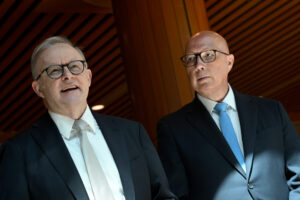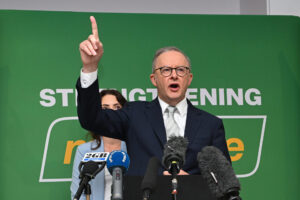By Richard Denniss, Chief Economist at The Australia Institute.
[Read this article in the Syndey Morning Herald]
One thing that unites the Australian Parliament is that subsidies are a great idea. Whether it’s the Liberals’ enthusiasm for subsidising weapons exports, the Nationals’ love of subsidising coal mines, Labor’s love of subsidising manufacturing or the Greens passion for subsidising renewables, there is broad consensus that subsidies are an important, legitimate and popular tool of policy.
But, as is so often the case in Australian politics, our parliamentarians seem to prefer to argue about the small differences that divide them rather than focus on big ideas that unite them. Once you accept that our Parliament loves to spend tens of billions of dollars per year subsidising everything from frigates and private schools to dental care and solar panels, it’s easy to jettison the meaningless philosophical debates about whether “free markets” are superior to “government intervention”. And once we jettison the phoney ideological debate, we can start a genuine democratic debate about what things Australia wants more of and what we want less of.
While subsidies have a bad name, all sides of politics agree, well-targeted subsidies are a great policy tool. If we didn’t subsidise vaccinations we would be a much sicker and poorer population. And if we didn’t subsidise childcare our kids wouldn’t do as well at school and the number of parents returning to work would be much lower.
Subsidies are important in the policy toolbox. Anyone who accepts that putting a tax on something we want to discourage, accepts the logic that we should consider subsidising things that we want more of. Expressed in econobabble: it makes perfect sense to impose a tax on goods that have “negative externalities” and grant subsidies to goods with “positive externalities”.
Put simply, the Australian parliament agrees that when you want people to consume more of something, subsidies work a treat. The disagreements are over what we want more of and how much we are willing to pay. While for decades we have been told that debates about whether to subsidise the car industry or the weapons industry were about economics, the fact is they are simply debates about what we should make more of and what we should make less of. Luckily, resolving such disputes about values and priorities is exactly what Parliament was invented to do.
So here we are in 2018, with a government betting our money that the world market for coal is set to surge. They might be right. But they might be wrong. Some people think that world demand for coal is unlikely to surge. BHP and Rio Tinto have sold most of their coal mines in recent years, and India and China are investing record amounts into renewable energy generation. But hey, who knows, the Coalition might be right.
In addition to the fact that the community wants more of some products, like vaccinations or child care, another common argument for subsidising an industry is called the ‘infant industry’ argument. That is, there are economic benefits to getting in on the ground floor of some industries and, in turn there are benefits for ‘first movers’. But given that coal mining industry has been around for centuries, its more geriatric than infant.
But the fact that the Coalition wants to subsidise old industries that the world is turning away from is not an indictment on subsidies. Rather it is an indictment on both their judgment and their ability to listen to the community. In a rapidly changing world there are enormous opportunities for governments to both deliver the community more of what they want, and potentially get in on the ground floor of rapidly emerging new industries.
Take electric cars for example. While they still account for a tiny proportion of new car sales, the growth rate of electric cars is as extraordinary as the price reductions that are occurring. China is not just the biggest market for electric cars, but also the fastest growing market. And while Tesla is having significant production difficulties at the moment it is important to understand that their problems flow from the fact that far more people want to buy Teslas than the Tesla factory can produce. It’s not a bad problem to have.
When teamed with rapid increases in renewable energy capacity, there is no doubt that the shift to electric cars has enormous potential to reduce greenhouse gas emissions, particulate pollution and noise pollution. All of these forms of pollution are the kind of ‘negative externalities’ that economics textbooks say justify the provision of a subsidy.
At the same time, as a country with enormous quantities of the natural resources required to make electric cars, there is little doubt that Australian manufacturers have the potential to play a major role in the global supply chain for electric cars. Even if we never exported a single electric car we could add enormous value to our raw materials and create an enormous number of jobs were we to stake a claim to the production of batteries or other key components.
The best thing about subsidising new products that the community wants more of is when you fund them by scrapping existing subsidies for things we want less of. That is, in Australia today we spend billions of dollars per year on subsidies to coal mines and subsidies for diesel fuel use which, quite literally, encourage increased pollution. In short, Australian taxpayers pay to do themselves harm.
If, however, we redistributed those subsidies away from mature industries that cause us harm towards infant industries that do us good, then we simply cannot lose. At worst we stop subsiding activities that cause pollution, and at best we help to kick start new industries that not only reduce the amount of ‘negative externalities’ floating around but increase the capacity to export the kind of products a post-coal, post-oil world is likely to want.
Low-income countries like China and high-income counties like Norway have decided to provide subsidies to encourage people to buy electric cars, and countries all around the world are developing strategies to ensure that they play a role in the electric car supply chain. But here in Australia, we are still subsidising coal mining, and diesel fuel use, and betting our manufacturing future on the world’s demand for frigates built in Adelaide.
Australia is one of the richest countries in the world and while we can’t afford to do everything we want, we can afford to do anything we want. The ideology of neoliberalism has been used for decades to persuade voters that subsidies are inefficient and ineffective, but the determination of the Coalition to subsidise coal mines, coal fired power stations, private health insurance, diesel fuel and the Snowy 2.0 makes a mockery of the suggestion that subsidies are something to be avoided.
The new question we face is – what is it we should be subsidising? To answer this we must ask ourselves: what things do we want more of? What do we want less of? What things will the world want more of? And what is the best way to help emerging industries? While there are no right answers for what we should subsidise, there are clearly some wrong answers. We should never subsidise things that we are trying to discourage.
And while people of good-will might disagree about what we need more of and what we need less of, luckily we have a parliament that was invented to answers exactly those questions. Once we ask the public what we should subsidise, I doubt that they will answer coal and diesel which, presumably, is why we have yet to ask the community that very question.
Richard Denniss is the Chief Economist for The Australia Institute @RDNS_TAI
Between the Lines Newsletter
The biggest stories and the best analysis from the team at the Australia Institute, delivered to your inbox every fortnight.
You might also like
Fossil fuel subsidies
When governments subsidise fossil fuels—coal, gas, diesel, petrol—they not only waste public money, they also make climate change worse. Subsidies and tax breaks make fossil fuels cheaper, making it harder to switch to renewable energy and cleaner technologies. Ending fossil fuel subsidies is common sense and good policy.
5 ways and 63 billion reasons to improve Australia’s tax system
With a federal election just around the corner, new analysis from The Australia Institute reveals 63 billion reasons why our next Parliament should improve the nation’s tax system.
Business groups want the government to overhaul the tax system? Excellent – we have some ideas.
The landslide win by the ALP has seen business groups come out demanding the government listen to their demands despite having provided them no support, and plenty of opposition, over the past 3 years.



